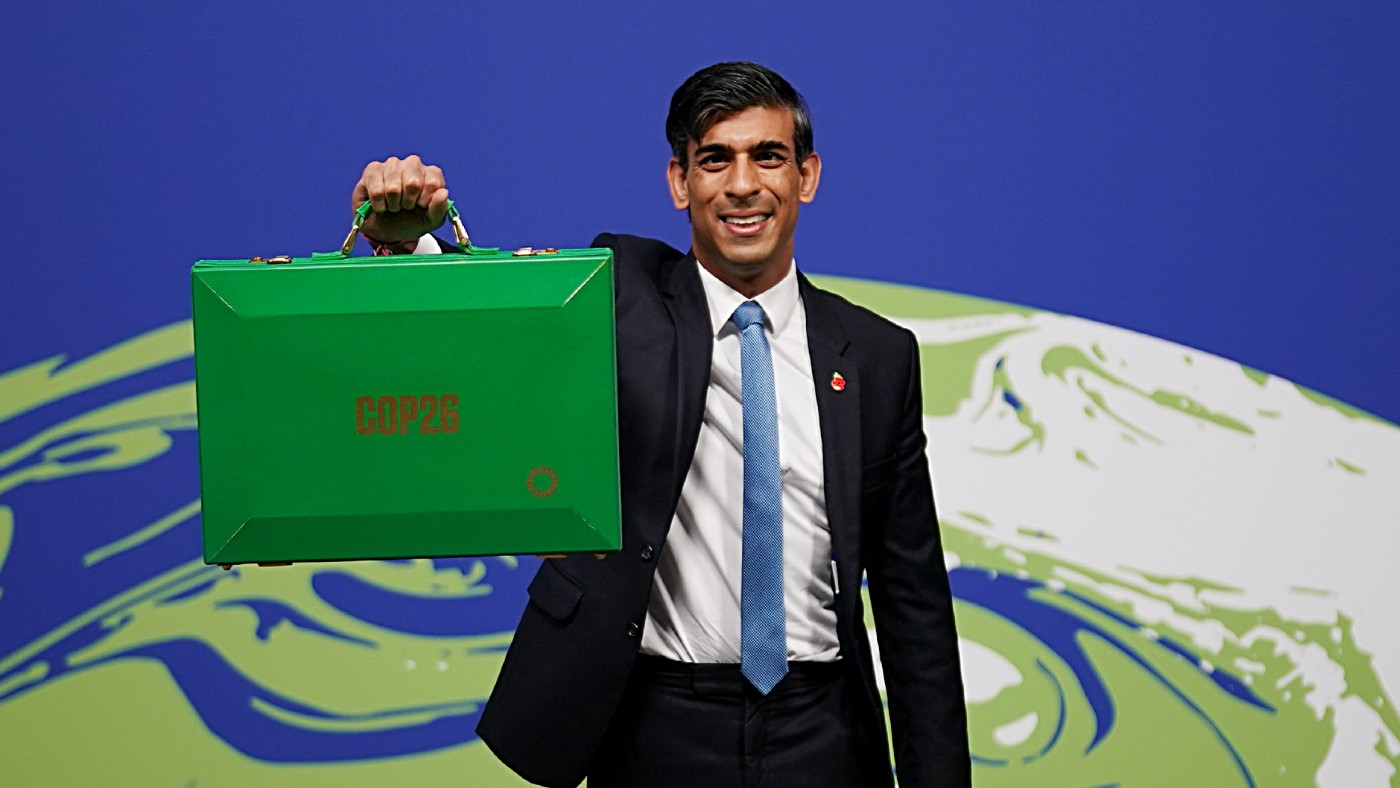Explained: UK’s aim to be first ‘net zero-aligned financial centre’
Chancellor outlines plans but campaigners warn of ‘greenwashing’

A free daily email with the biggest news stories of the day – and the best features from TheWeek.com
You are now subscribed
Your newsletter sign-up was successful
It’s finance day today at the Cop26 climate summit and Rishi Sunak has outlined the government’s plan for the UK to become the world’s first “net zero-aligned financial centre”.
The chancellor arrived in Glasgow carrying a green version of the traditional red budget briefcase and addressed an audience of finance ministers, central bank governors and senior industry leaders.
Sunak told delegates it was “easy to feel daunted by the scale of the challenge we face” but is optimistic that Cop26 will bring together leaders to “direct the world’s wealth to preserve our planet”, Yahoo Finance! reported.
The Week
Escape your echo chamber. Get the facts behind the news, plus analysis from multiple perspectives.

Sign up for The Week's Free Newsletters
From our morning news briefing to a weekly Good News Newsletter, get the best of The Week delivered directly to your inbox.
From our morning news briefing to a weekly Good News Newsletter, get the best of The Week delivered directly to your inbox.
Net zero finance centre: how would it work?
Sunak said the UK will “go further” in the climate fight by becoming the first net zero-aligned financial centre. “This means we are going to move towards making it mandatory for firms to publish a clear, deliverable plan setting out how they will decarbonise and transition to net zero with an independent task force,” he said.
Most big UK firms and financial institutions will be forced to show how they intend to hit climate change targets, under proposed Treasury rules, the BBC reported. By 2023 they will have to set out “detailed public plans for how they will move to a low-carbon future” and an expert panel will “set the standards the plans need to meet to ensure they are not just spin”.
In a statement The Treasury explained that next year the UK will publish a “transition pathway” for the financial sector to achieve the 2050 net zero goal. The “comprehensive plan” will give the sector the “information they need to take climate into account in every financial decision”.
A free daily email with the biggest news stories of the day – and the best features from TheWeek.com
‘Greenwashing’ the financial sector?
Sunak hopes to “rewire the entire financial system” to help protect the climate. However, any commitments will not be mandatory and green groups have said this is not enough, the BBC reported.
The Guardian’s environment correspondent Fiona Harvey said there’s “widespread concern” that Sunak has “missed the opportunity to make a real change” to the way businesses and financial institutions operate when it comes to the climate and net zero.
Jennifer Larbie, Christian Aid’s UK advocacy and policy lead, welcomed that the chancellor recognises London’s financial sector as “critical to any meaningful progress” towards a global net zero. But the announcement “does little to shift the dial now on the trillions still flowing into fossil fuel projects every day”. She added: “The UK government must mandate the financial sector to act with urgency to end fossil fuel investments.”
Campaigners have also warned that the chancellor’s plan falls short of what is needed to halt the climate crisis and risks amounting to no more than “greenwash” for a sector which has profited massively from decades of pollution, The Independent reported.
Greenpeace UK accused Sunak of going to Cop26 with “a marketing slogan” instead of taking transformative action. Rebecca Newsom, Greenpeace UK’s head of politics, said the new rules seem to allow “plenty of wriggle room for financial institutions to continue with business as usual, rather than ‘rewiring’ the system as the chancellor claims”. She added: “The chancellor is once again falling short of what the climate emergency requires.”
-
 The plan to wall off the ‘Doomsday’ glacier
The plan to wall off the ‘Doomsday’ glacierUnder the Radar Massive barrier could ‘slow the rate of ice loss’ from Thwaites Glacier, whose total collapse would have devastating consequences
-
 Can the UK take any more rain?
Can the UK take any more rain?Today’s Big Question An Atlantic jet stream is ‘stuck’ over British skies, leading to ‘biblical’ downpours and more than 40 consecutive days of rain in some areas
-
 As temperatures rise, US incomes fall
As temperatures rise, US incomes fallUnder the radar Elevated temperatures are capable of affecting the entire economy
-
 The world is entering an ‘era of water bankruptcy’
The world is entering an ‘era of water bankruptcy’The explainer Water might soon be more valuable than gold
-
 Climate change could lead to a reptile ‘sexpocalypse’
Climate change could lead to a reptile ‘sexpocalypse’Under the radar The gender gap has hit the animal kingdom
-
 The former largest iceberg is turning blue. It’s a bad sign.
The former largest iceberg is turning blue. It’s a bad sign.Under the radar It is quickly melting away
-
 How drones detected a deadly threat to Arctic whales
How drones detected a deadly threat to Arctic whalesUnder the radar Monitoring the sea in the air
-
 ‘Jumping genes’: how polar bears are rewiring their DNA to survive the warming Arctic
‘Jumping genes’: how polar bears are rewiring their DNA to survive the warming ArcticUnder the radar The species is adapting to warmer temperatures


